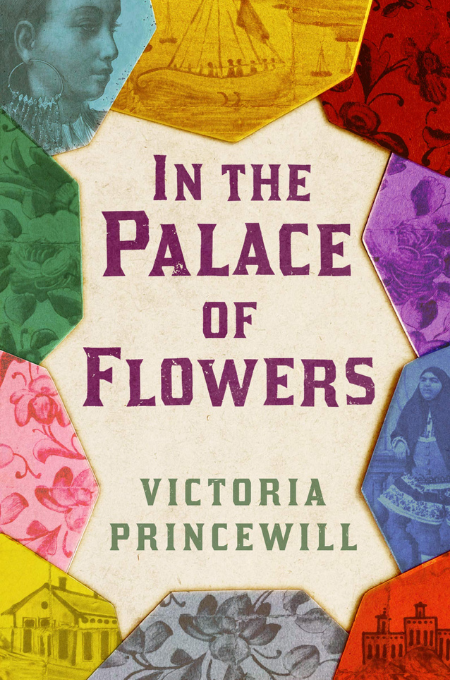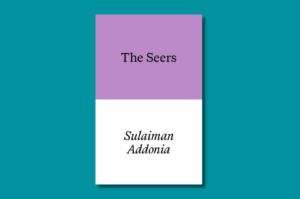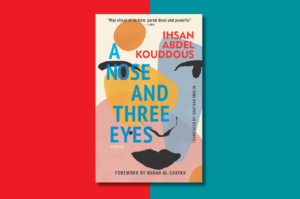
We shall be forgotten, Jamı̄la realised, watching the funeral rites with empty eyes.
She usually enjoyed the funerals. The slaves heard the tragedies first; gossip slid through walls and under doors. Distress seeped into antechambers: the news, like the life itself, unspooled quickly. In the first house where she had served, Jamı̄la would rise early to hear the recitation of the Qur’an from the roof. Back then, the older slaves would turn a blind eye whilst she darted into an empty bedroom to peer through a window, scanning the roofs of the houses nearby to see where the imam was reciting from. He would stand on the roof that housed the deceased, the sound of his announcement a bell to her mind. She had always enjoyed the sobriety. A life had been lost, and that weight meant something. Precisely what, she remained unsure of.
It was January; almost the end of the year. Death seemed fitting, as an end to a cycle. Still, Jamı̄la did not want to be there but whilst women were forbidden from the service, any Abyssinian slave who had served him had to be present. And so Jamı̄la stood amongst them, at the back of the mosque. He had been one of the noblemen free to enter the harem, a physician for the Shāh and his wives. Jamı̄la, recalling his slithery presence, suspected the slaves’ attendance was required to bolster the numbers.
The imam’s monotone never wavered. Jamı̄la was bored. She stared up at the curved dome of the mosque’s ceiling: thousands of minuscule sapphire tiles adorned it. Mingled with dazzling glass, the tiles dripped from the walls. She sought to count them, but, glancing around, saw hers was the only upturned face. She stared at the floor. She traced a silk embroidered shoe over the marble, wishing she could stand on the slivers of exposed stone. She looked up. Every slave in the mosque faced forward; there was nary a shuffle nor a sigh. She lowered her shoulders and lifted her chin, trying to practise solemnity. The faces of the nobles were haggard and drawn. The prince – her prince – her old playmate behind closed doors in the harem quarters, who used to sneak smiles at her through crowds – he too was facing forward, his expression indistinguishable from the rest. For a moment, she wondered how he might behave at her funeral.
But, of course, she would not have one. Not long ago, a slave had died. He was thrown into an unmarked spot in one of the gardens where a glut of bodies lay. Jamı̄la could not help but see them in her mind, jumbled together: anonymous, rotting, mute. Nobody was notified. Wherever his birth family was, they remained ignorant – full of hope, perhaps, or consumed with despair.
With the ceremony completed, the slaves headed back to Golestan Palace at a brisk pace. The snow had arrived late this year, and it was tentative at first; the falling flakes appeared to falter, so much she barely felt them as they trembled onto her cheek. She brushed her face as she walked, the velvety crunch beneath her floral mules a world away from the soft clouds wrapped snugly around a gable of one of the palace roofs. Jamı̄la had lived there for only four years, yet without question she felt it was home. The sprawling complex of gorgeous buildings formed a medley of colours as indigo arabesque tiles, stone carvings in flaxen gold and emerald muqarnas, undimmed by winter’s first frost, captured the eye. Returning here would always give her pause, even as men sighed, stooped over, brows studded with sweat, working on the Shāh’s latest renovation. But it was not hers, any more than it was theirs, and as she tramped through the geometric gardens, shivering under her thin čhādor in the crisp evening air, she felt a sudden thrill at the realisation. On darker days, she had called herself fortunate. She would linger by the precision-cut flowerbeds. This is your home. She would repeat the words until the pain of her bruises began to fade. This is your home. Now she felt foolish. Was this her home? Did it matter? The earth is the earth is the earth, as her mother liked to say. Jamı̄la’s lips trembled. She continued walking.
Jamı̄la was the last slave to return to the harem from the mosque, and as she hurried through the passageway to her mistress’s apartment, she began to feel a touch of unease. The harem was large, built to house and entertain over 80 wives and concubines, with communal entertaining spaces, like the royal coffeehouse and the royal theatre. The wives all had private residences, most in adjoining interior courtyards, and one had to cross the length of the harem, past the various pantries, salons, and harem offices to get to them. Jamı̄la’s mistress, Chehra Khaanoum, like many of the newer poorer and younger wives, had an apartment even further out, far from the communal spaces. As such, Jamı̄la was always late getting to her, regardless of her intentions or how she tried to be on time. Chehra used to be more forgiving, but in recent months, her patience had worn thin. There was always something that gave Chehra reason to complain.
Jamı̄la would often hear Chehra’s plaintive cries as she snapped at Gul, the most senior slave in her retinue, over the size of her room. When Jamı̄la first arrived, it was Gul who told her that the wives were housed according to their status. They all lived in grand apartments, plush rooms with high ceilings and gilded furniture, adjacent to the main harem. Chehra’s five rooms, though a squeeze for her slaves, were more than sufficient to Jamı̄la.
As she pushed open the door to the apartment, she bumped into Gul standing on the other side. ‘Jamı̄la!’ she said, sighing and rolling her eyes.
‘I am here!’ Jamı̄la was looking past Gul.
‘She is in her room,’ Gul said, a laugh in her voice. A robust slave, whose wrinkled smiles revealed a warmer woman than her frame would assume, she ran Chehra Khaanoum’s household with benign efficiency. She had little patience for Jamı̄la’s tardiness but thought it more prudent to mask it than openly scold her for it. ‘You should know, Jamı̄la, she is angry.’
‘Might I ask why?’
‘Abimelech requested you.’
‘Abimelech?’ A smile spread across her face.
‘On behalf of the prince,’ Gul said. ‘Prince Nosrat summoned you.’
‘Then I must go!’ Jamı̄la turned back to the door.
Gul shook her head, grimacing. ‘Chehra Khaanoum insisted you stay. She became…unhappy, shall we say. She asked, “Is Jamila his concubine or my slave?”’
‘Well, if I was the prince’s concubine, perhaps I might have some rooms of my own.’
‘Be serious, Jamı̄la. She wants you to draft a letter to someone on the Shāh’s council.’
‘Gul, all I do is write correspondence.’
‘This is different. She would have him stop seeing you. She shall take a sudden interest in “finding Nosrat Mirza a wife”.’
Chehra’s door was slightly ajar; she was bathed in a chink of light, pacing the room. Jamı̄la knocked and pushed it open, watching as Chehra glanced at her and continued to pace at a furious, unstable speed. She was soft and plump with a heavy brow that was perpetually furrowed. She would insist on having her face painted on with precision every single morning, but, due to her frequent naps during the day, would have a smeared face and stained pillow by midday. Her make-up today was meticulous: cheeks burnished tulip-pink, rosebud lips shone a cherry red and the faint lines of soft hair that trickled from her nose to the top of her lips looked lightly brushed. Jamı̄la, noting this, with muted surprise, realised with some foreboding that Chehra Khaanoum had not had her daily rest.
‘Shahzadeh Khaanoum,’ Jamı̄la addressed her formally and dipped into a deep bow.
‘Are you ready to work?’ Chehra demanded in a high- pitched tone.
‘Yes, Shahzadeh Khaanoum,’ Jamı̄la answered, and placed herself attentively beside the desk, wondering whether Chehra might stop walking long enough to offer instructions.
‘How was the service?’ Chehra asked. Without waiting for a response, she burst out, ‘We have work here, Jamı̄la. You have to be here to serve me, not everybody else.’
‘Yes, Shahzadeh Khaanoum. What should—’
‘I have been invited to a dinner this evening!’
‘Shall I—’
‘I was certain that they loathed me; they strive to make me uncomfortable. They smile, but they do not speak, their politeness merely a mask…Could I have been mistaken? It was Raem, Raem Khaanoum, who invited me. Are you aware of Raem Khaanoum? She lost her son in childbirth last year, but prior to that she was the Shāh’s beloved. They say he does not call on her now. You are to assist me here and when I return. Select my attire; I still have to find…’
Jamı̄la watched Chehra Khaanoum with interest; even her burbling seemed frenetic. She had taken to drinking during the day, but she was too alert to be drunk already. Usually when Chehra overindulged, she became sloppy and maudlin. Jamı̄la thought perhaps she should get Gul, but before she could suggest it, Gul appeared at the door.
‘Nothing to alarm you, Shahzadeh Khaanoum,’ she said, but her face was fraught. ‘The chief eunuch is outside. Nosrat Mirza, it appears, is rather insistent. He has requested the company of Jamı̄la this evening. It transpires that he is… ah…unhappy with the delay…’
Jamı̄la stared from Chehra to Gul and back again. Her eyes widened. Chehra marched past her and out to the front door, Gul and Jamı̄la hurrying behind. Chehra stepped outside and pulled the door closed behind her. Jamı̄la winced as Chehra began to shout and looked to Gul. The chief eunuch sounded obsequious, his words filled with platitudes and promises. When the front door was flung open, Chehra marched past again and slammed her room door shut. The chief eunuch looked at Jamı̄la, trying for a smile. His lips withdrew as he spoke, baring two sets of teeth. ‘The Shāhzadeh has summoned you to his quarters in the ḵalwat. Proceed with haste.’









COMMENTS -
Reader Interactions